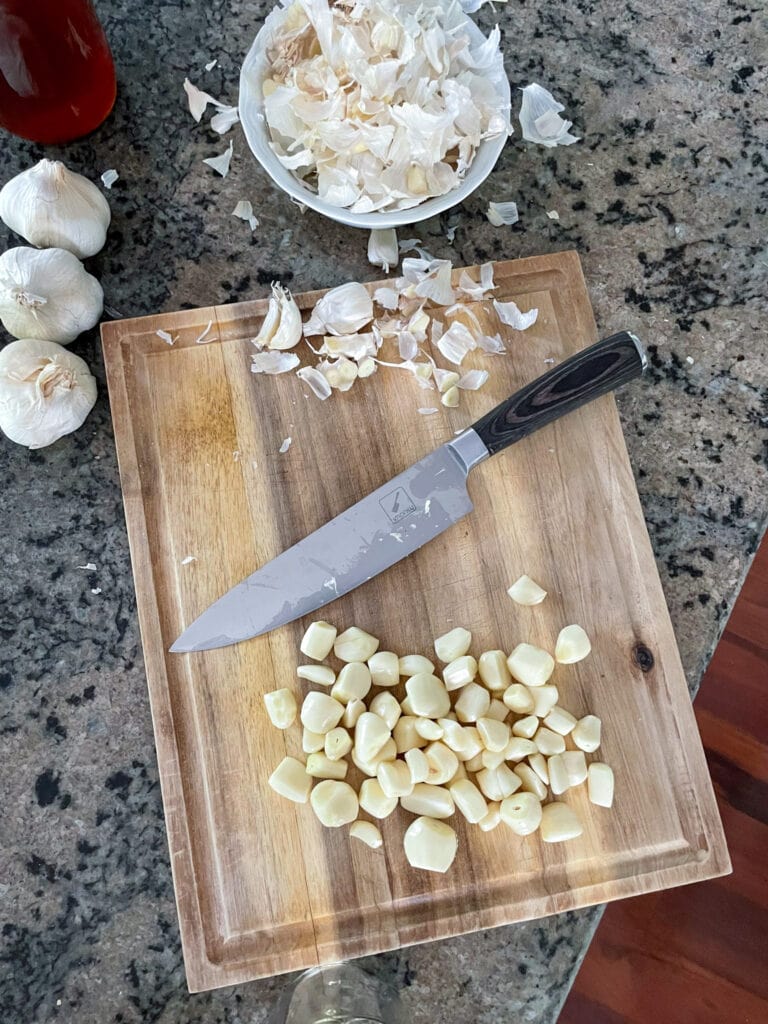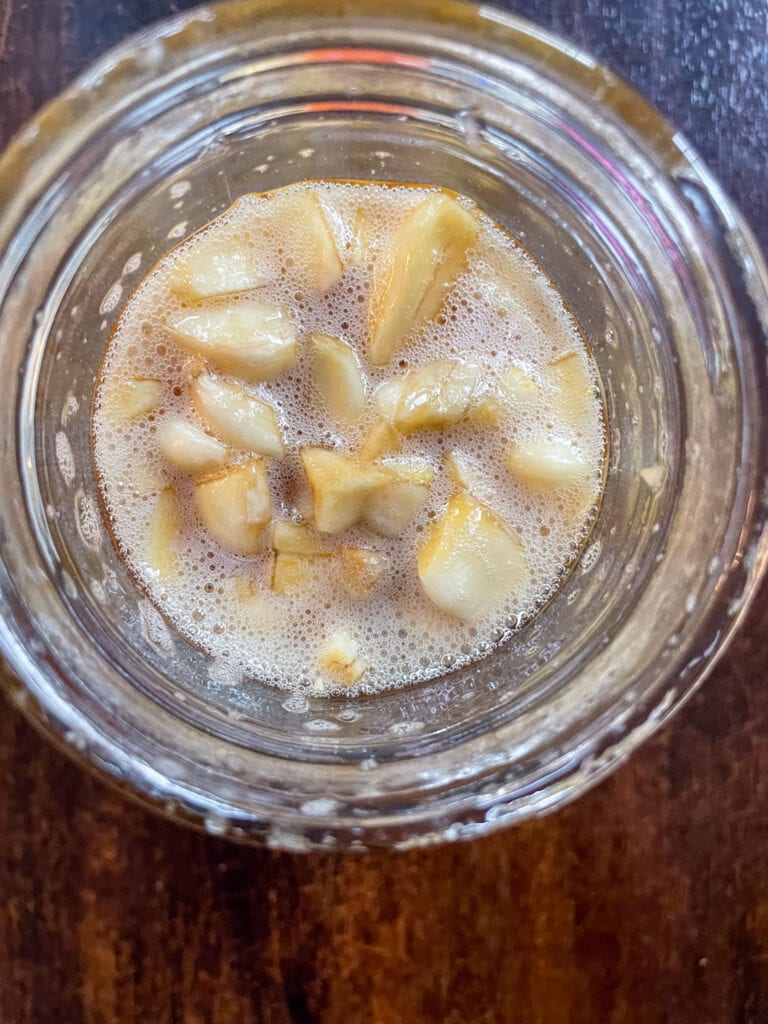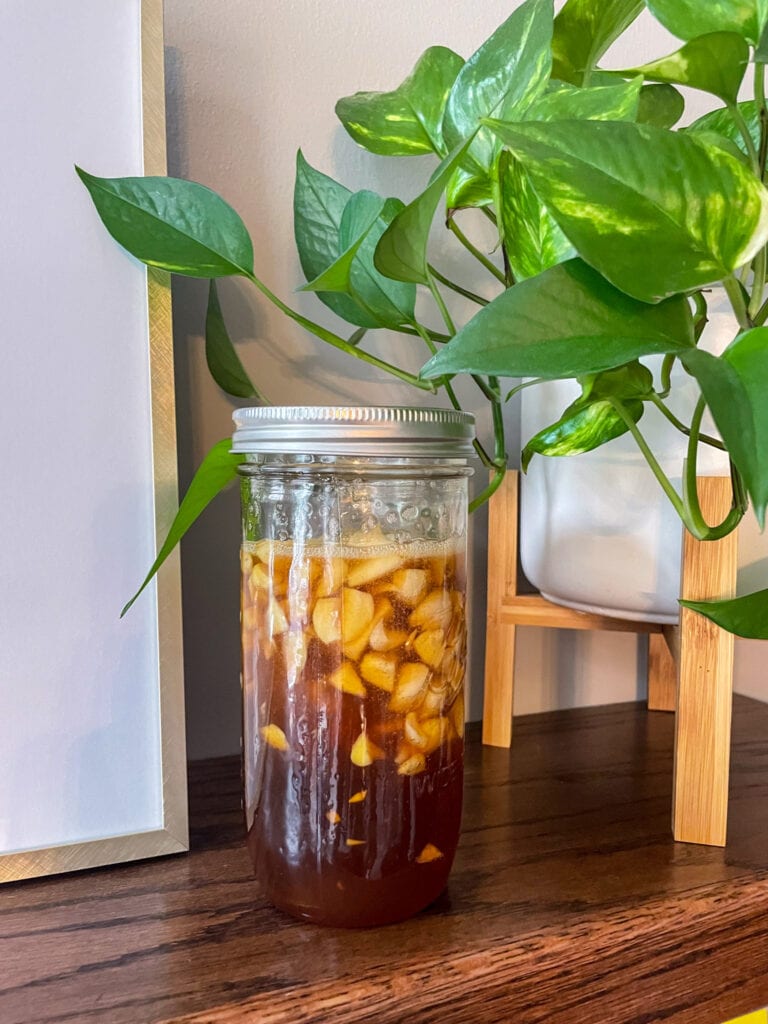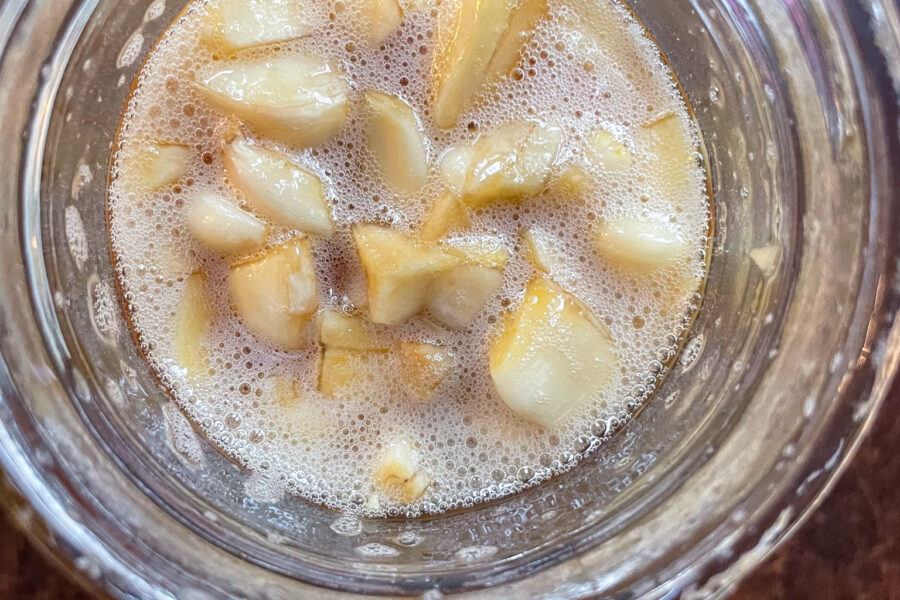After fielding questions on IG about it, I decided that my fermented garlic and honey needed a dedicated post of it’s own. Not that I should call it mine because I didn’t come up with it; it’s a homeopathic staple that has been around for years and years because it works.
Combining the powerful antiviral and antibacterial power of allicin in garlic with the healing and soothing properties of honey and the final gut health helper of fermentation means this simple to make concoction is a must have for cold and flu season.
Why Fermented Garlic and Honey
The combination of garlic and honey create a potent antimicrobial, antioxidant-rich syrup. Allowing the mixture to ferment increases its effectiveness by boosting the immune system and aiding in digestion.
How to Make Fermented Garlic and Honey
Sterilize a mason jar by boiling it for 10 minutes. Remove carefully and allow it to cool. Meanwhile, peel enough garlic to fill 1/2-2/3 of your jar. For my 24 oz jar, I used 5 large heads of garlic. Give them a rough chop and add them to your jar.
Using local raw, unfiltered honey, fill the jar, leaving some headroom at the top (at least 1″) but ensuring all the garlic cloves are thoroughly covered. Some garlic cloves will float up in the honey; that’s ok.
Apply the lid and place the jar in a dark place, like your pantry. Every day (this is important), burp the jar, which simply means open it, allowing the built up gases to escape. Then reapply the lid and give it a little shake. Within a few days, you’ll notice some bubbles forming on the surface; this is a sign that the process of fermentation is active.
You will need to burp the jar daily for about two weeks. You’ll notice the honey becoming less viscous and more runny during this fermentation process. After two weeks you will still need to open the jar occasionally if not using consistently, but the build up of gases will slow down over time. You can use it at any point, but it will become more potent with time. After 4-6 weeks the liquid will be runny and it will be at it’s optimal strength.



How to Use Fermented Garlic Honey Syrup
Some people eat the garlic cloves when they need a boost to their immune system and others prefer just to use the syrup. Either way is fine. At the first sign of feeling run down or a throat tickle, eat a garlic clove or ingest a spoonful of the honey as needed.
It also can be used in salad dressings or to drizzle over cheese platters or pizzas for a robust boost of both flavor and nutrition.
Shelf Life
As long as you store it correctly, in an airtight container in a dark place, the fermented honey and garlic can stay good for years. It is normal for the mixture to darken over time.
Notes
- It’s important to use raw honey because it will retain the wild yeast necessary for fermentation.
- Do not use with babies less than 1 year old.
- Botulism really isn’t a concern. Any reading under 4.6 is considered safe and honey is usually at 3.9. You can test with pH strips if you’d like and if the reading is higher than you like, you can add a splash of apple cider vinegar to lower the pH.
- You can jazz it up in so many ways- add a cinnamon stick, sprinkle in cayenne pepper or turmeric, include chopped ginger. The combinations are plentiful.
Helpful Links
- Encyclopedia of Herbal Medicine – colorful, detailed, and clearly explains the basics of herbal medicine. Great for beginners.
- pH Test Strips – for testing the pH levels for foods and drinks.
- Find my other favorite natural cold remedies here.



sherry says
Sounds much more palatable than chewing on a clove of raw garlic 🙂
Will give this a try!
Elizabeth says
Love this. Going to give it a try. How much honey do you suppose is needed?
Brittany Dixon says
It doesn’t need to be exact, because it depends on the size of your jar, but 1 c honey to 1 c raw, peeled garlic cloves is a standard ratio. I used more honey because I had a bigger jar and it worked just fine!
Maggie says
This is a great remedy! FYI, I wouldn’t call this a homeopathic remedy – that would mean it is a highly diluted remedy where you take a minute dose of a substance, but it is definitely a natural remedy! Even though garlic isn’t an herb, per se, maybe you could call it an herbal remedy.
Brittany Dixon says
Good point! I’ll switch the title 🙂